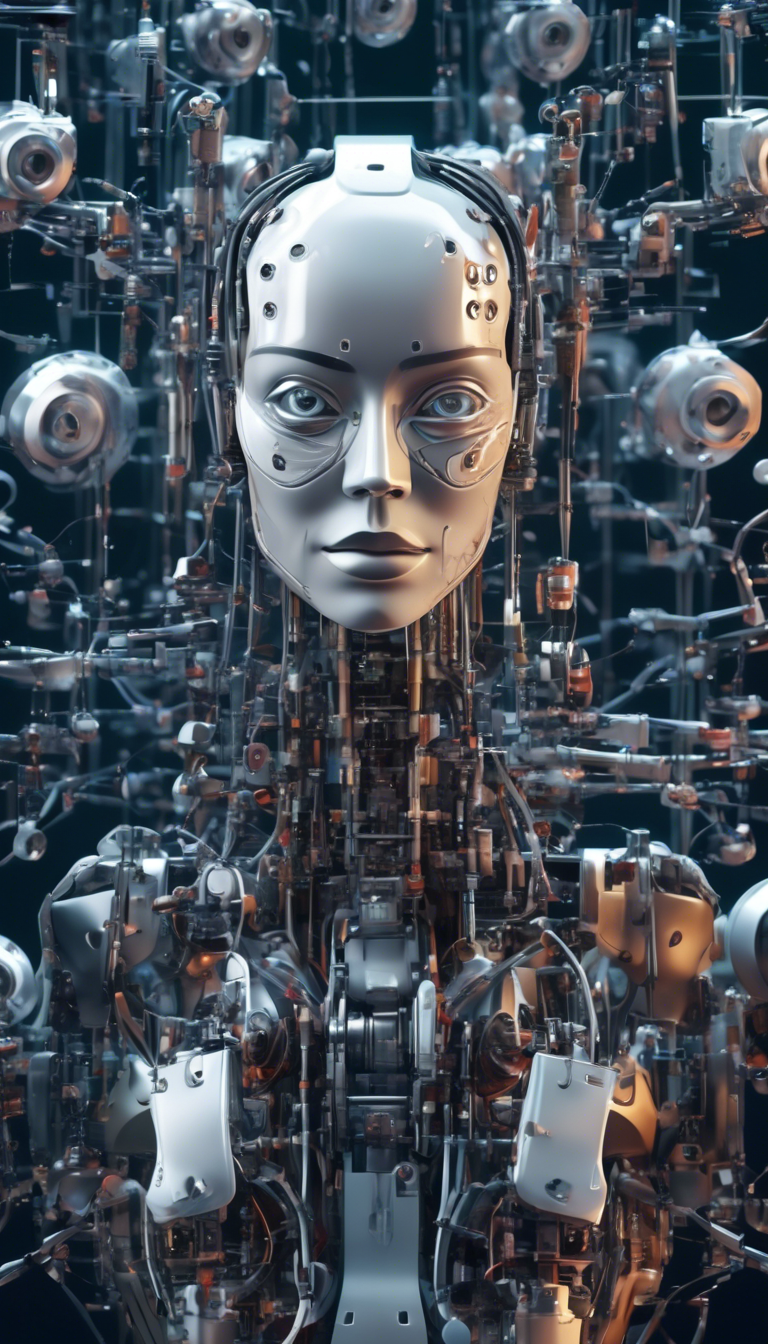The Impact of AI Automation Tools for Business on Operational Efficiency
In today’s fast-paced corporate environment, businesses are increasingly turning to AI automation tools to boost operational efficiency. These advanced technologies streamline routine tasks, enhance analytics, and enable more informed decision-making, ultimately driving productivity and profitability. Understanding how these tools impact daily operations can empower organizations to leverage their full potential.
The integration of AI automation tools transforms various business functions. From customer service to supply chain management, the applications are vast. One significant impact is the reduction of human error. By utilizing machine learning algorithms and AI-driven data processing, companies can minimize mistakes that often occur in manual workflows. This reliability fosters a more consistent output and enhances the trust of stakeholders and clients alike.
AI automation tools also significantly expedite processes. For instance, consider how automated chatbots handle customer inquiries. Instead of waiting for a human representative, customers receive immediate responses, leading to improved satisfaction rates. This efficiency means that employees can focus on more complex tasks, such as developing creative solutions and innovation, rather than getting bogged down by routine questions and requests.
Employee productivity often soars with the adoption of these tools. Automating repetitive tasks allows team members to concentrate on strategic initiatives. For example, marketing departments can utilize AI to analyze vast amounts of customer data, identifying trends and preferences that inform targeted campaigns. By investing time and resources into high-value activities, companies are more likely to achieve their strategic goals.
Utilizing AI automation tools also enhances collaboration across departments. These systems can integrate seamlessly with existing software, centralizing information and making it more accessible. As a result, teams can share insights and data, enabling them to work harmoniously toward common objectives. Enhanced collaboration leads to a more cohesive company culture, which is vital for long-term success.
Another noteworthy impact is improved scalability. As businesses expand, their operational demands often increase exponentially. AI automation tools offer the flexibility to scale processes without compromising quality. Organizations can easily adjust their automation strategies to accommodate growth, ensuring a smooth transition and maintaining efficiency as they evolve. This adaptability positions companies favorably in a competitive marketplace.
However, while the advantages are clear, it’s essential to acknowledge some potential challenges. Implementing AI automation requires a thoughtful approach, considering employee training and system integration. If teams struggle to adapt, the full benefits of automation might not be realized. Effective change management is critical in this regard. Businesses should cultivate a culture that embraces technology and encourages continuous learning to maximize the potential of automation tools.
When selecting AI automation tools, organizations should consider the following criteria:
- Ease of Use: The tool should be user-friendly to ensure that employees can navigate it without extensive training.
- Integration Capabilities: Tools that can seamlessly integrate with existing systems will provide a smoother transition.
- Scalability: The ability to grow and adapt to changing business needs is essential.
- Cost-Effectiveness: Assess the total cost of ownership, including any additional expenses for training and support.
- Vendor Support: Choosing a vendor with strong customer support can greatly impact long-term success.
Indeed, the landscape of business operations is rapidly changing thanks to AI automation tools. Companies that adopt these innovations can expect to see marked improvements in all areas, from operational efficiency to employee satisfaction. By embracing this technology now, businesses position themselves for sustainable growth and competitive advantage.
As AI automation continues to evolve, keeping abreast of developments and emerging tools will help organizations stay ahead. Continuous investments in technology and employee training are paramount for maximizing efficiency. After all, the goal is not just to automate but to innovate, creating a work environment where both human and machine contributions are valued and harnessed for future success.
Future Trends in AI Automation and Their Potential Effects on Various Industries
The rapid advancement of artificial intelligence (AI) has led to significant transformations across industries. AI automation is at the forefront of these changes, revolutionizing how businesses operate. It empowers companies to streamline processes, enhance efficiency, and improve customer experiences. Understanding future trends in AI automation and their potential effects can help businesses adapt and thrive in an increasingly competitive landscape.
Transformative Effects on Industries
AI automation tools are set to impact various sectors significantly. Here are some key industries that will likely see substantial changes:
- Manufacturing: Factories are adopting AI-driven robots for tasks ranging from assembly to quality control. These robots can operate with precision and efficiency, reducing human error and increasing production speed.
- Healthcare: AI is transforming diagnostics and patient care. Automation tools assist in analyzing medical data and predicting patient outcomes, leading to more personalized treatments.
- Finance: In the financial sector, AI automates processes such as fraud detection, risk management, and transaction analytics. Machine learning algorithms analyze vast datasets quickly, identifying trends that human analysts might miss.
- Retail: Automated customer service chatbots and personalized marketing algorithms are becoming commonplace. They enhance customer engagement by providing tailored recommendations and instant support.
- Transportation: With the rise of self-driving technology, logistics and supply chain operations are becoming more automated. AI optimizes routing, reduces transit times, and improves fuel efficiency.
Emerging Trends in AI Automation
As we look ahead, several trends in AI automation are emerging that promise to deepen its integration into business workflows:
- Integration of AI with IoT: The Internet of Things (IoT) and AI are converging, creating smarter systems. For instance, connected devices can provide real-time data, enabling AI algorithms to improve operations dynamically.
- Natural Language Processing (NLP): Advancements in NLP allow machines to understand and respond to human language more effectively. This enhances AI’s role in customer service, as chatbots become more conversational and less scripted.
- AI Ethics and Governance: As AI usage expands, so do concerns about ethics and accountability. Companies are focusing on developing responsible AI that prevents bias and respects privacy.
- Hyperautomation: This trend involves the use of AI and machine learning to automate complex processes that span multiple systems. Its aim is to streamline end-to-end workflows, saving time and reducing operational costs.
Potential Challenges Ahead
While the future of AI automation holds great promise, some challenges are worth noting. Businesses must navigate these hurdles to fully leverage automation’s potential:
- Workforce Displacement: One of the most significant concerns is job loss due to automation. Companies must consider workforce reskilling to help employees transition into new roles created by automation.
- Data Security: As automation relies heavily on data, ensuring data security becomes paramount. Cybersecurity measures must evolve to protect sensitive information.
- Integration Costs: The initial costs of implementing AI automation can be high. Businesses need to assess their budgets and potential ROI to make informed decisions.
Preparing for the Future
Businesses must proactively prepare for the changing landscape wrought by AI automation. Here are some strategies they can embrace:
- Invest in Training: Reskilling the workforce ensures that employees can work alongside AI technologies, optimizing their value within the organization.
- Embrace Agility: Companies should be prepared to adapt quickly to technological changes. This includes being willing to pivot strategies and invest in new tools as they emerge.
- Collaborate with AI Experts: Working with AI specialists can provide companies with insights into integrating AI automation tools effectively into their operations.
As businesses navigate the complexities of AI automation, staying informed and adaptable will be key. The trends and challenges outlined here present opportunities for innovation and growth. Organizations that embrace these advancements will likely lead the way in their respective industries.
Conclusion
AI automation tools for business have fundamentally reshaped the landscape of operational efficiency across various industries. As organizations continue to embrace these technologies, the results are evident: increased productivity, streamlined processes, and reduced operational costs. Businesses leveraging AI-driven automation not only enhance their internal workflows but also significantly improve their customer experience. By automating routine tasks, teams can focus on strategic initiatives that drive innovation and growth. The ability to analyze data at remarkable speeds has transformed decision-making processes, allowing businesses to respond swiftly to market changes and consumer demands.
As we gaze into the future, the role of AI automation is poised for even greater evolution. Various sectors are expected to benefit from advancements in machine learning, natural language processing, and robotic process automation. For instance, the healthcare industry stands to gain immensely as AI tools can aid in predictive analytics, enhancing patient care and improving diagnosis accuracy. In retail, AI can revolutionize inventory management by predicting consumer trends and automating restock orders. Each of these applications showcases the adaptability of AI automation tools for specific industry needs, proving that they are not one-size-fits-all solutions.
Moreover, the integration of AI automation tools in business will catalyze significant changes in workforce dynamics. Employees will increasingly function alongside intelligent machines, where collaboration will become the norm. This partnership can result in enhanced job satisfaction, as employees are freed from monotonous tasks, allowing them to engage in more meaningful work. However, this shift will also necessitate a commitment to reskilling and upskilling existing staff to ensure they can effectively work alongside these advanced technologies. Companies recognizing the importance of continuous learning will likely lead the charge in harnessing the full potential of AI automation.
Furthermore, as organizations consider implementing AI automation, they must remain vigilant regarding the ethical implications that come with such technologies. The potential for bias in algorithms, data privacy concerns, and job displacement must be addressed proactively. Transparent practices that prioritize ethical standards will build trust among customers and stakeholders alike. Businesses that take the initiative to establish ethical guidelines surrounding AI usage will not only meet regulatory requirements but also set themselves apart in a competitive landscape.
Security will also be a paramount concern moving forward. As AI automation tools become more integrated into critical business processes, their vulnerabilities can pose significant risks. Ensuring robust cybersecurity measures are in place will be essential to protect sensitive data and maintain the integrity of automated systems. Companies must invest in comprehensive security strategies that include regular assessments and updates to defend against emerging threats.
The impact of AI automation tools will not be confined to individual companies; it will have ripple effects throughout supply chains and communities. By enhancing efficiency and productivity, AI-driven technologies can reduce waste and contribute to sustainable practices. For example, smart factories utilizing AI tools can optimize resource allocation, minimizing production waste and energy consumption. This approach not only benefits the planet but also aligns with the growing consumer demand for socially responsible business practices.
Additionally, industries can anticipate even more personalized solutions as AI automation technologies continue to advance. As businesses gather vast amounts of data through AI, they can tailor products, services, and experiences to individual customer preferences. This hyper-personalization results in businesses being more attuned to the needs of their clients, building stronger relationships and fostering loyalty.
The integration of AI automation tools for business represents not just a trend but a significant transformation reshaping the way organizations operate. The drive towards improved operational efficiency, enhanced decision-making capabilities, and stronger customer relationships will only gain momentum as technology continues to evolve. Companies that embrace these tools with an eye on ethical considerations, workforce development, and security will position themselves for sustainable success in the years to come. As we move toward this promising future, collaboration between human intelligence and artificial intelligence will be key, fostering innovation that drives progress across industries.


